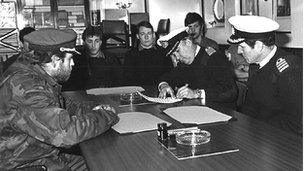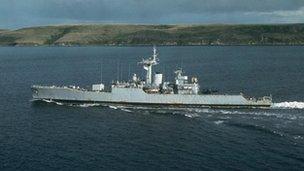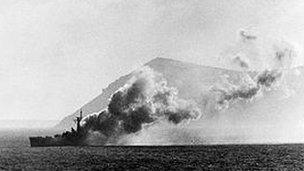Falklands warship HMS Plymouth to be scrapped
- Published

The surrender of Argentine Forces in South Georgia was signed onboard HMS Plymouth
A warship which hosted the Argentine surrender of South Georgia during the Falklands conflict has lost its battle for survival.
HMS Plymouth, currently moored off the River Mersey, faces being scrapped.
The Rothesay class frigate was originally saved from the same fate by the Warships Preservation Trust after being decommissioned from the Royal Navy in 1988.
It was taken to Birkenhead, Wirral, where it has remained berthed for the past 20 years.
Instrumental in victory
The contrast between HMS Plymouth's illustrious naval history and the boat's current situation is a stark one.
Originally launched in 1959, it was involved for the entire Falklands conflict of more than two months in 1982.
It was instrumental in Britain's victory over Argentina and the subsequent reclaiming of the South Atlantic islands.
Now, it floats in Vittoria Dock, Birkenhead, unseen by many and soon to be scrapped.
Dan Entwisle, a journalist specialising in maritime defence, said: "Britain has a terrible, shocking record in preserving its naval heritage.
"In this country we just seem incapable of doing it, whether it is a lack of will, whether it is mismanagement - time and time again there are plans to preserve ships when they go out of service.

HMS Plymouth served in the Falklands War in 1982
"Sometimes it works for a while and then it all goes wrong - in Plymouth's case this has happened."
HMS Plymouth was saved from scrappage in the early-1990s and brought to Merseyside to form part of a floating exhibition at Birkenhead docks.
But the trust, responsible for its upkeep, went into liquidation six years ago and she was passed by default into the hands of Peel Ports who own the docks.
Efforts to preserve the boat as a historic naval exhibit have come close, but ultimately failed.
A former crew member from the HMS Plymouth Preservation Trust, Andy Hayler said: "One of the issues that we have is, whereas buildings can get listed, vessels can't.
"We have a number of sailing frigates around, one in Hartlepool and elsewhere, that have not got any battle honours and they weren't even built in the UK and yet they are being preserved.
"There is no overall comprehensive policy for recognising those vessels that are important to our history and heritage at sea and identifying them and preserving them."
'An empty shell'
It is now only a matter of time before HMS Plymouth is taken away to be scrapped.
Peel Ports have agreed a "deconstruction contract" with a Turkish firm and are awaiting an export licence from the Environment Agency.
Work is now ongoing to preserve artefacts from the ship so future generations can continue to learn about her history.
Mr Hayler added: "I understand the process is under way and possibly nearing completion so the items that have been deemed to be of relevance are being removed and then you'll have an empty shell which can be scrapped.

HMS Plymouth was attacked by Argentine aircraft on 8 June 1982
"But the problem for us, as I see it, is that you can take things out of context.
"If you take them out and put them in a glass cage they need to be shown within the area and the manner in which they were used."
In a statement, Peel Ports said it was an "unfortunate coincidence" that the deal coincided with the 30th anniversary of the Falklands War commencing.
A Peel Ports spokesman said: "A deconstruction contract has been agreed with a specialist company from Turkey, and we are now in the process of obtaining export certification from the Environment Agency.
"We are obviously very sorry that no permanent home has been found for HMS Plymouth given her rich and proud history.
"We have been working closely with partners throughout the consultation period, including National Historic Ships, and we aim to ensure all items of historic value are safely removed and retained for preservation.
"It is the end of a process that has taken over two years - and to a great extent the date of the culmination was out of our hands."
- Published2 April 2012
- Published2 April 2012
- Published2 April 2012
- Published2 April 2012
- Published16 February 2012
- Published27 February 2012
- Published30 March 2012
- Published30 March 2012